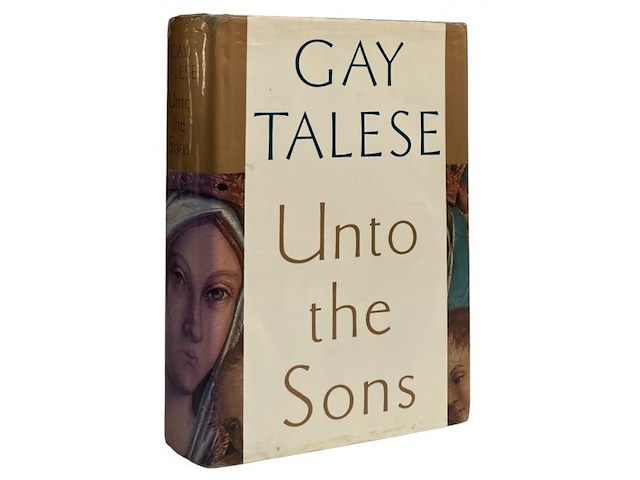Pratite promene cene putem maila
- Da bi dobijali obaveštenja o promeni cene potrebno je da kliknete Prati oglas dugme koje se nalazi na dnu svakog oglasa i unesete Vašu mail adresu.
1-1 od 1 rezultata
Broj oglasa
Prikaz
1-1 od 1
1-1 od 1 rezultata
Prikaz
Prati pretragu "id:234077481"
Vi se opustite, Gogi će Vas obavestiti kad pronađe nove oglase za tražene ključne reči.
Gogi će vas obavestiti kada pronađe nove oglase.
Režim promene aktivan!
Upravo ste u režimu promene sačuvane pretrage za frazu .
Možete da promenite frazu ili filtere i sačuvate trenutno stanje
U dobrom stanju Hardcover: 635 pages Publisher: Hutchinson(January 28, 1992) Language: English ISBN-10: 0679410341 ISBN-13: 978-0679410348 Product Dimensions: 2 x 6.8 x 9.5 inches Shipping Weight: 2.6 pounds Bestselling writer Gay Talese uses his own family history to tell the epic story of an Italian family over three generations. Moving from a tiny feudal village in southern Italy to the battlefields of the First World War, to Paris in the 1920s, and finally to the promised land of America, Unto the Sons is a brilliant mixture of history and story-telling. Talese carries us into the nineteenth-century patriarchal world of his great-grandfather in the village of Maida (after which London’s Maida Vale was named)—a region immersed in the mysticism of the Church and haunted by echoes of Roman glory and the subsequent waves of foreign invasion. His story moves from Italy to America and back again as it follows the men of the village, among them the author’s grandfather. Their half-lives in a Pennsylvania factory town are vividly evoked, as are their infrequent reunions with their wives, the fabled “white widows” left behind in Italy, who summon up the passion to make a place for themselves and their children. The story takes a new turn as one of these children, Joseph, comes to America in 1920—marrying, making his way, embracing the new world yet unable wholly to relinquish the old. Joseph’s painful sense of divided loyalty is intensified by the outbreak of World War II, and embodied in his relationship with his American-born son, the young author, who sees himself as an “alien” under his father’s roof, yet still an “outsider” on the flag- waving Protestant island of Ocean City. Interweaving historic fact with details gathered from family tales, interviews, letters, and diaries, Gay Talese has juxtaposed his family’s adventures with the dominant events and disasters that have affected their lives. Encompassing three generations and two World Wars, Unto the Sons combines the breadth of history with the intimate dreams of family. It is a captivating human story that powerfully evokes the universal experience of immigration. Gay Talese (/təˈliːz/; born February 7, 1932) is an American writer. As a journalist for The New York Times and Esquire magazine during the 1960s, Talese helped to define contemporary literary journalism. Talese`s most famous articles are about Joe DiMaggio and Frank Sinatra. Talese`s first piece for the magazine Esquire – a series of scenes in the city – appeared in a special New York issue during July 1960.: 23 When the Times newspaper unions had a work stoppage during December 1962, Talese had plenty of time to watch rehearsals for a production by Broadway director Joshua Logan for an Esquire profile. As Carol Polsgrove indicates in her history of Esquire during the 1960s, it was the kind of reporting he liked to do best: `just being there, observing, waiting for the climactic moment when the mask would drop and true character would reveal itself.` In 1964, Talese published The Bridge: The Building of the Verrazano-Narrows Bridge, a reporter-style, non-fiction depiction of the construction of the Verrazzano-Narrows Bridge in New York City. In 1965, he left The New York Times to write full-time for editor Harold Hayes at Esquire. His 1966 Esquire article on Frank Sinatra, `Frank Sinatra Has a Cold`, is one of the most influential American magazine articles of all time, and a pioneering example of New Journalism and creative nonfiction. With what some have called a brilliant structure and pacing, the article focused not just on Sinatra himself, but also on Talese`s pursuit of his subject. Talese`s celebrated Esquire essay about Joe DiMaggio, `The Silent Season of a Hero` – in part a meditation on the transient nature of fame – was also published during 1966. For his part, Talese regarded his 1966 profile of obituarist Alden Whitman, `Mr. Bad News,` as his finest. A number of Talese`s Esquire essays were collected into the 1970 book Fame and Obscurity; in its introduction, Talese paid tribute to two writers he admired by citing `an aspiration on my part to somehow bring to reportage the tone that Irwin Shaw and John O`Hara had brought to the short story.` In 1971, Talese published Honor Thy Father, a book about the travails of the Bonanno crime family in the 1960s, especially Salvatore Bonanno and his father Joseph Bonanno. The book was based on seven years of research and interviews. Honor Thy Father was made into a TV movie in 1973. During 2008, The Library of America selected Talese`s 1970 account of the Charles Manson murders, `Charlie Manson`s Home on the Range`, for inclusion in its two-century retrospective of American True Crime. In 2011, Talese won the Norman Mailer Prize for Distinguished Journalism.

